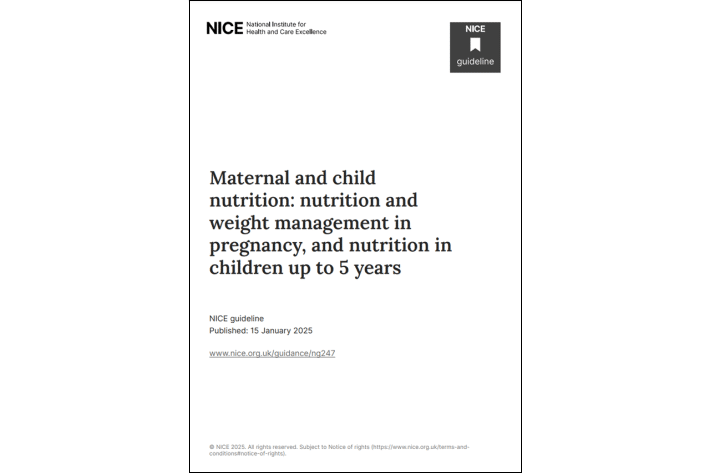On 15 January 2025, NICE published the much anticipated updated guidance “Nutrition and weight management in pregnancy, and nutrition in children up to 5 years” (NICE guidance 247).
NICE guidance 247 replaces guidance on “Maternal and child nutrition” (PH11), partially replaces “Weight management before, during and after pregnancy” (PH27), and has been developed to be read in conjunction with guidance on “Overweight and obesity management” (NG246).
Through a review of the evidence in PH11, this new guidance is intended to provide clear recommendations from pregnancy, through the postnatal period and into early childhood, using the current evidence base and recommendations from research and subject experts. The guidance covers the following key areas:
- Vitamin supplementation, including the Healthy Start scheme and clarification on folic acid now that bread and flour are fortified.
- Healthy eating, physical activity and weight management during pregnancy.
- Breastfeeding and formula feeding beyond 8 weeks after birth, returning to work and the value of continuing until around 2 years or beyond.
- Weighing babies and young children.
- Healthy eating behaviours in babies and children from 6 months and up to 5 years.
The guidance has been written for all healthcare professionals working with those who are pregnant, babies and children under 5 years old; in particular, midwives, dietitians and health visitors. One of the overarching messages that is embedded throughout the guideline is the importance of personalised healthcare, through tailored, non-judgemental, culturally sensitive conversations, using evidence-based information to improve maternal and child nutrition.
Key points of interest for health visitors include:
- The importance of appropriate support for breastfeeding before birth and during the first weeks after birth to enable continued breastfeeding for longer – alongside messaging on the importance of focus on face-to-face contacts, both individually and in groups, to achieve this (recommendations 1.3.1 to 1.3.10).
- The importance of discussing vitamin supplements, including vitamin D at health visitor appointments (1.1.10).
- Guidance on the introduction of solid foods (complementary feeding) for babies between 6 months and 1-year-old – including a comprehensive “topics to discuss” section (1.5.1- 1.5.7). The guidance makes specific reference that:
- Commissioners and providers of services should support healthcare professionals who have knowledge and expertise in introducing solid foods to babies (for example, health visitors) to act as ‘champions’ to pass on information to other staff (1.5.2).
- When the baby is between 4 and 5-months-old, health visiting teams or other community health services should arrange an opportunity for parents to find out more about introducing their baby to solid food from the age of 6 months. This could be a face-to-face or online appointment, phone consultation or group session (1.5.5).
To read the guidance in full, follow this link https://www.nice.org.uk/guidance/ng247








